Political scientists often claim that debates don’t have much effect on the outcome of an election, but Chris Cooper, professor of political science at Western Carolina University, begs to differ.
“In a race like this, debates can matter,” Cooper said Sept. 4, minutes before Republican Madison Cawthorn of Hendersonville and Democrat Moe Davis of Asheville met for their first public debate. “When we’re still forming opinions of these candidates and learning more about who they are, then anytime we can hear from them in their own words, it’s an important moment.”
Demonstrators on South Asheville roadways ahead of the event had already made up their minds. Veterans backing Davis hoisted banners and earned honks of support from motorists along Long Shoals Road, while nearly 100 Cawthorn devotees rallied outside Western Carolina University’s Biltmore Park instructional site under the watchful eyes of Asheville police officers.
The late summer evening rang with shouts, applause and the roar of unmuffled truck engines outside the event venue as the Cawthorn crowd waved signs and cheered pickups trailing huge flags at the Schenck Parkway roundabout.
“He’s got the grassroots energy,” said Hendersonville resident Brett Ellison, 52, of Cawthorn. “I think he’s quite the guy. We need young blood up there [in Washington] to clean out some of that mess. So, he needs to go to Congress.”
Tracy Fletcher, 52, of Hendersonville agreed. “One of the things that was very important to me about Madison is that he’s able to verbalize what he believes. He’s very conservative in his politics. He loves America. I think that’s very important.”
Status quo v. fireworks
Despite a court-ordered change to district lines for the 2020 election, Republicans still have the advantage in Western North Carolina’s 11th Congressional District, Cooper said. “Even with the redrawn lines, about 57% of this district voted for Donald Trump. So, I would expect that a status quo night is a good night for Madison Cawthorn, and a night with more fireworks is a better night for Moe Davis.
“What Davis is going to want is the ability to land some blows that he can use as sound bites and that he can use to promote his campaign,” Cooper said. “What Cawthorn’s going to want is a solid, stable performance that doesn’t disrupt too much of the status quo.”
By that standard, the Sept. 4 debate may have benefited Davis, who went after his opponent over claims that Cawthorn had been dishonest about the outcome of his bid to attend the U.S. Naval Academy, had sexually pressured young women in the years following his recovery from a near-fatal car accident and had used a racial slur in a text to a friend. Cawthorn vigorously defended himself and attacked Davis for his record as the lead prosecutor of accused terrorists at Guantanamo Bay, Cuba, as well as his support among a “fringe left element” that Cawthorn said wants to degrade the country.
In comments posted on the Facebook livestream during the debate, Davis’ attacks seemed to resonate with his supporters, who described their candidate as the “only grownup in the room” and someone who “can solve problems, not spew empty words.”
“Cawthorn is a D-student with no education and no experience, not sure why anyone would vote for him,” shared Susan Zitro a few minutes into the livestream. Her comment was echoed by Bob Gossett a few minutes later. “Most candidates run on their record of public service,” he wrote. “Madison Cawthorn does not have one.”
Policy issues frequently took a backseat to what Cawthorn called “character assassination,” and Davis described as Cawthorn’s “problem with the truth,” but the debates did include some substance. Below, assistant editor Daniel Walton summarizes the positions covered during the first night of the series, and reporter Molly Horak rounds up the main points of the second night.
The debates were sponsored by Smoky Mountain News, Blue Ridge Public Radio and Mountain Xpress and were streamed live via Facebook. Video of the first night is available at avl.mx/877; watch the second night at avl.mx/878.
— News analysis by Virginia Daffron
Sept. 4 debate
Climate change
Both candidates acknowledged the danger that human-driven climate change poses to the planet and emphasized the development of alternatives to fossil fuels as their main policy tool. Beyond those basics, their differences in dealing with the problem appeared to be mainly rhetorical.
Cawthorn, a self-described “green conservative,” called for an “all of the above” approach for clean energy that would include nuclear, solar and wind power. But he repeatedly criticized more comprehensive climate measures such as the Green New Deal championed by Democratic Rep. Alexandria Ocasio-Cortez of New York and Sen. Ed Markey of Massachusetts; on at least three separate occasions, he claimed that such legislation would “waterboard future generations” with unsustainable debt. (Davis resigned his former post as chief prosecutor of suspected terrorists at Guantanamo Bay, Cuba, over objections to the use of waterboarding and other torture techniques in interrogations.)
Davis did not explicitly defend the Green New Deal but instead emphasized the “good jobs with a good wage” that could come from the alternative energy sector. He also suggested that lawmakers should extend tax credits for renewables that congressional Republicans and President Donald Trump have allowed to phase out.
Health care
Again, both candidates found a point of agreement as they concurred that America’s current health care system is in desperate need of reform. However, they offered starkly contrasting solutions to those systemic failures.
Davis called for the creation of a public option, a government-sponsored form of health insurance that would compete with private insurers. That approach, he said, would provide more cost-effective care for those who don’t receive insurance through their employers.
But Cawthorn argued that a public option was a Trojan horse for a complete government takeover of health care, saying it would cripple the consumer market to the point of infeasibility. Instead, he preferred expanding private competition in the insurance market, giving consumers more choices in an effort to drive down prices.
COVID-19 response
Criticized by Davis for hosting large in-person campaign events during the COVID-19 pandemic, Cawthorn said he had encouraged his supporters “to make the decision that is best for them” regarding social distancing and mask wearing. “You need to wear a mask if you are in that area of your life where you may have a preexisting condition or you’re at an age where COVID-19 will greatly affect you,” Cawthorn added; state health officials, however, say masks should be worn by everyone, including healthy individuals who may be carrying the coronavirus without experiencing symptoms.
“I prefer to get my advice from experts who actually made it through college,” Davis responded — an apparent dig at Cawthorn, who left Patrick Henry College after one year. The Democrat said he supported the recommendations of health officials and would follow them at all of his campaign events: “If you want to be in public service, the first thing you do is not put the public at risk, and I’m not going to do that to pander to my ego or try to win an election.”
Economic development
Davis said the government should create “concentric circles” of support to help individuals find paths out of poverty. He advocated for the development of broadband in rural areas, more funding for education, greater access to health care and a higher minimum wage.
Meanwhile, Cawthorn drew from the traditional Republican playbook as he called for lower taxes and fewer regulations to encourage business growth. He also supported the expansion of opportunity zones, a provision in the Trump-sponsored Tax Cuts and Jobs Act that gives tax advantages to investments in low-income areas; critics of the program have said it accelerates gentrification and fails to help historically marginalized populations.
Gun control
Some of the debate’s most contentious exchanges took place over the subject of firearms and their regulation. Cawthorn cited an article in The Blue Banner, the student newspaper of UNC Asheville, in which Davis suggested he would lose the election if he publicly shared his willingness to ban assault weapons.
“That’s exactly what Moe Davis wants us to do, to lay down our weapons and trust the government because they’re going to take good care of us,” Cawthorn said while pledging his support for the Second Amendment. “How did that work out for the Native Americans?”
Davis responded that, while he “would like to have no assault weapons on the streets,” he was campaigning on a policy that would establish more stringent standards for gun ownership. Similar to current requirements for concealed carry, those rules would require prospective owners of assault weapons to undergo a background check and complete a full-day safety course.
Law enforcement
Davis attempted to find a middle ground in the current national debate over the role of policing and its implications for racial justice; he noted that he had recently attended both a “Back the Blue” rally in support of law enforcement and a Black Lives Matter protest. While the Democrat decried “defund the police” as both a slogan and concept, he said he supported “reimagining” how agencies go about their duties and expanded treatment for residents with mental health or substance abuse issues.
Noting that his fiancée is biracial, Cawthorn stated that law enforcement officers should treat everyone with “dignity, honor and respect.” He also criticized Trump for what he called a “lack of empathy” in the police killing of Black Minneapolis resident George Floyd.
However, Cawthorn stopped short of proposing any systemic reforms to policing. “I truly believe that we should always hold each other to a higher standard,” he said. “I think that we need to have a level of personal responsibility to be able to self-govern ourselves.”
— Daniel Walton
Sept. 5 debate
Broadband
The candidates agreed that limited access to broadband internet creates a barrier to education and telehealth services and that a strong digital network would spur regional growth.
Davis voiced support for an $80 million Democratic-sponsored house bill which would expand access to rural communities using a model based on the Rural Electrification Act of 1936. “If you don’t have broadband and you’re up in a holler, a laptop is just a paperweight,” he noted.
The role of a conservative government is to create a strong infrastructure to “help the private sector flourish,” Cawthorn said after telling the story of a McDowell County mother who took her children to a local McDonald’s with free WiFi to do their homework. He advocated for tax incentives for companies “laying the extra mile” of broadband to connect rural residents.
National, student debt
Dubbing the national debt the country’s “greatest national security risk,” Cawthorn argued that young people like himself should not be saddled with the spending of past generations. Citing traditional Republican policy positions, he said the only way to lower debt is by cutting taxes, so people have more money to “wean off of welfare programs.”
Davis agreed that the size of the national debt was a problem for the country but aside from supporting more “prudent” spending on health care and the military, he didn’t offer specific strategies to reduce spending. Instead, he criticized Trump’s tax cuts, which he said had done little to help the district’s working class. “What’s great for Madison Avenue and Madison Cawthorn wasn’t so great for Madison County,” he said.
Cawthorn asserted that Davis’ proposal to reform student loan programs and restructure existing student loan debt would cause the federal deficit to balloon. Davis responded that he views education spending as an investment. The federal Department of Education should purchase outstanding student loan debt, he said, and allow borrowers to pay back their debt at 0% interest or through a commitment to public service.
Cawthorn responded that rising college costs need to be checked. He blamed “liberal policies” for stifling the job market, making it impossible for college graduates to find high-paying jobs, pay off debt and build wealth through homeownership.
Trade and tariffs
The opponents offered differing approaches to foreign trade policy. Cawthorn, who “grew up in a house of financial advisers,” said he’s willing to use tariffs against countries like China that are “violating human rights” — especially if that would bring steady manufacturing jobs back to the region.
Davis, a proponent of free trade, said he sees green technology as “the path forward.” He pointed to his record working as a federal Department of Labor judge processing H2A and H2B agricultural visa requests. Davis called for business owners to be held accountable if they exploit undocumented workers by paying them lower wages than documented employees.
Underrepresentation of minority groups
Asked by Principal Chief of the Eastern Band of Cherokee Indians Richard G. Sneed about minority representation in Congress, Davis said there are too many people in Congress who look like him and Cawthorn. If elected, his team will reflect people in the district, both in demographics and place of residence, Davis vowed.
Cawthorn said his accident taught him “perseverance, grit and empathy.” In its aftermath, he felt “invisible,” so he “knows what it’s like to be someone who the government has left behind.” In Washington, he’s willing to look beyond individual differences and work together with all types of people.
Davis leveraged a detail in Cawthorn’s personal story as the basis for one of the night’s fiercest attacks: After Cawthorn said he was 6 feet, 3 inches tall at the time of his injuries, Davis immediately referenced Cawthorn’s statement in a deposition that he had been 6-foot-1. “You make yourself bigger in every story you tell. But look at your actions, your use of the ‘N’ word, your actions toward women,” Davis said.
“It’s a common trait among liberals to debate silly things,” Cawthorn countered.
Checks on executive power
The candidates agreed that Congress needs to do a better job of holding the president accountable and return an appropriate share of power to the legislative branch. Both President Barack Obama and Trump deployed their executive powers too broadly, Cawthorn said; he also criticized judges who “legislate from the bench.”
To effectively govern, Congress needs to work with the president while also holding the executive branch accountable, Davis responded. If elected, his first order of business would be to “bring ethics back to Capitol Hill” because “no one is above the law.”
— Molly Horak



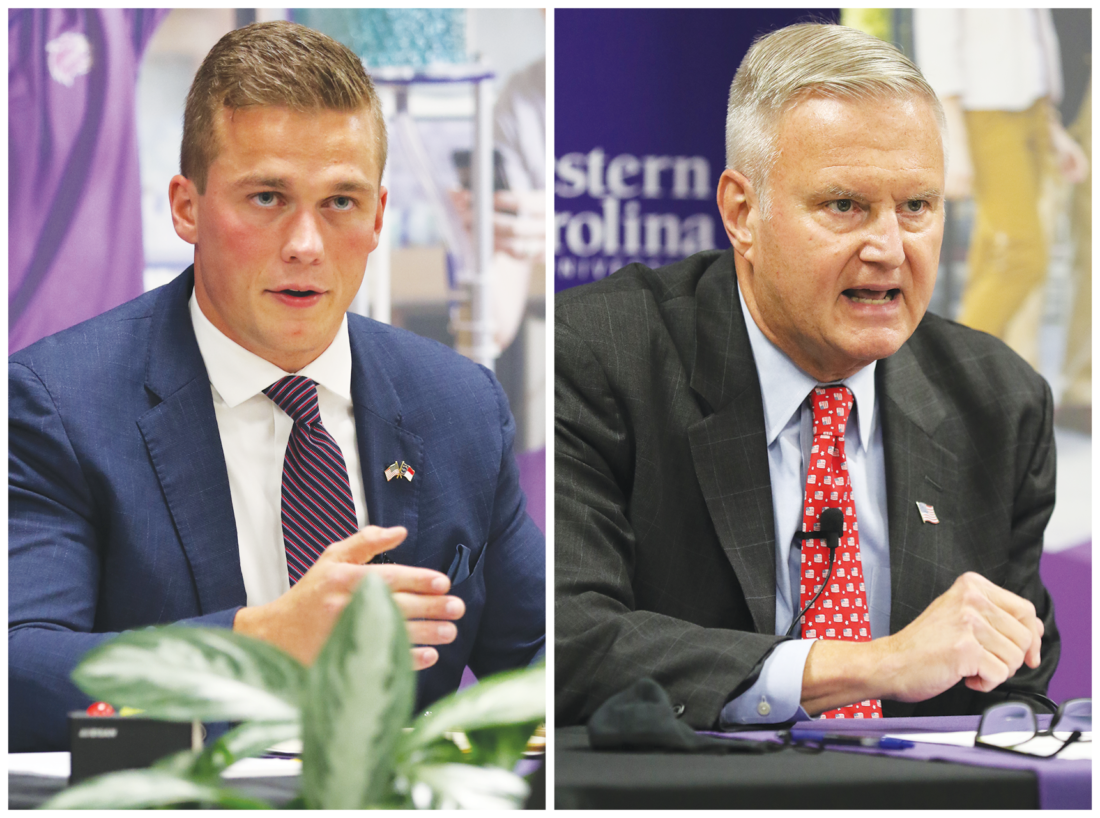
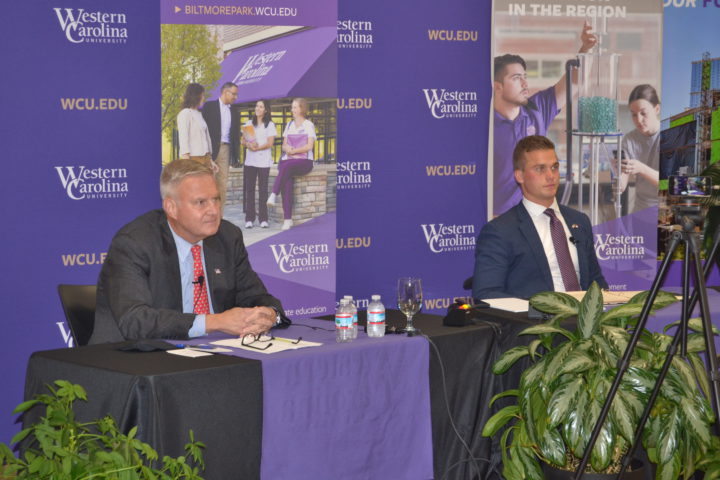
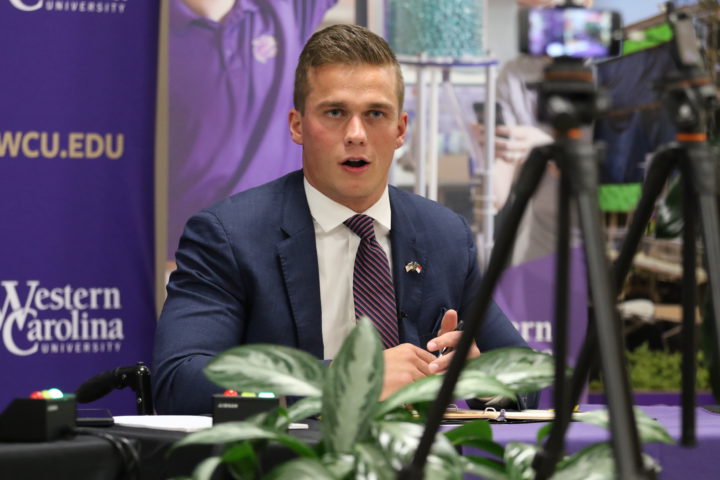
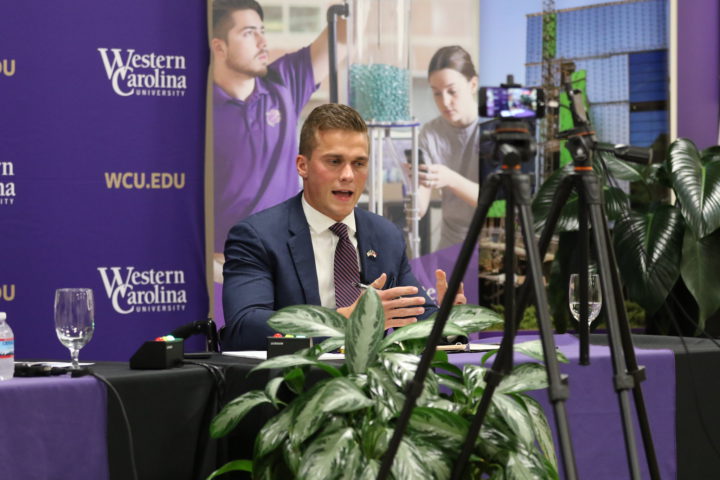
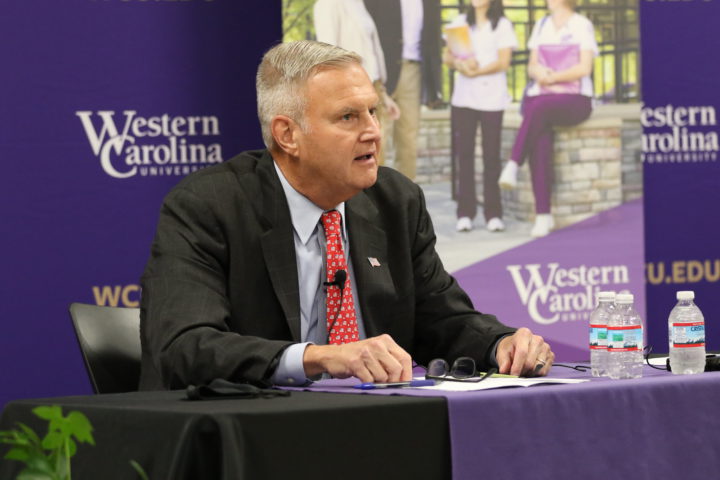
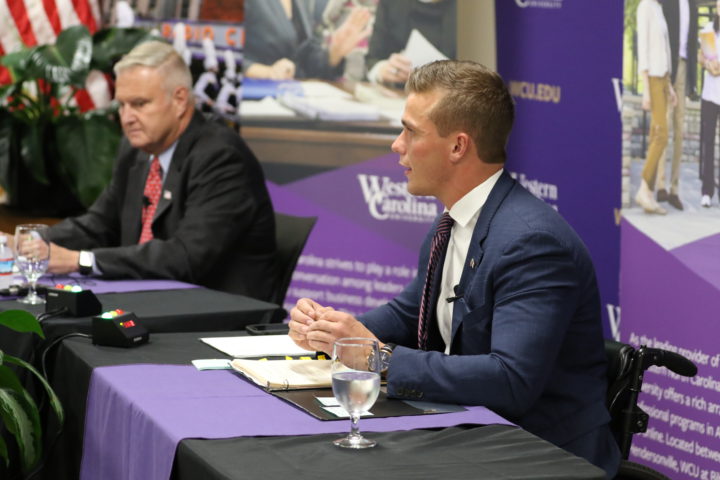
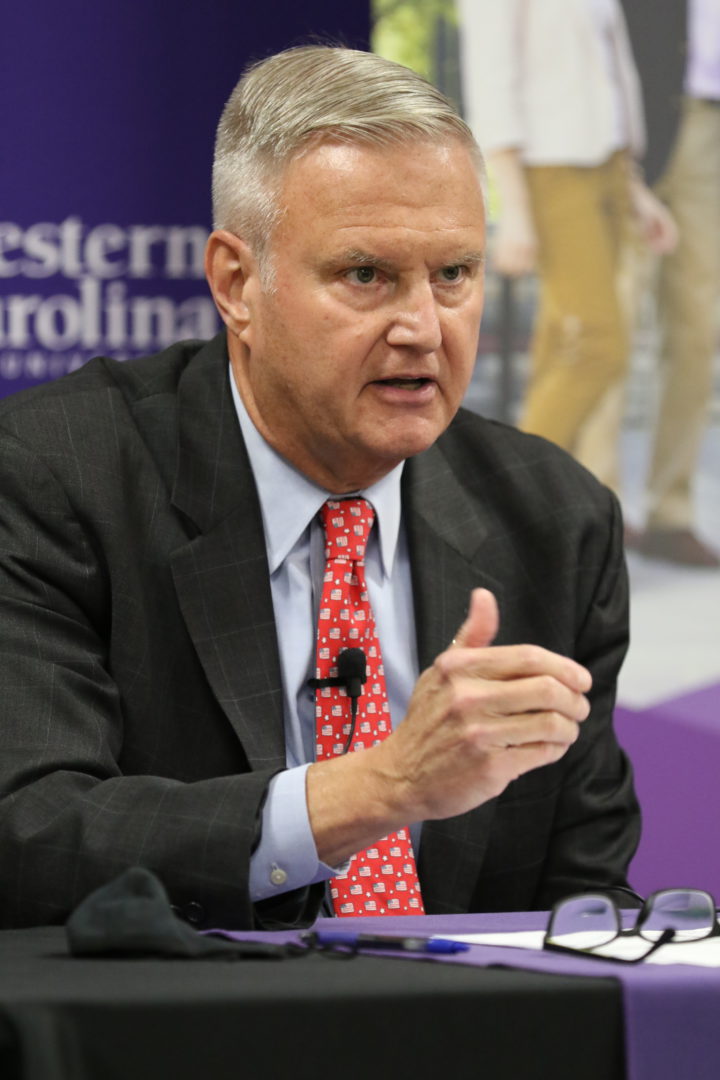

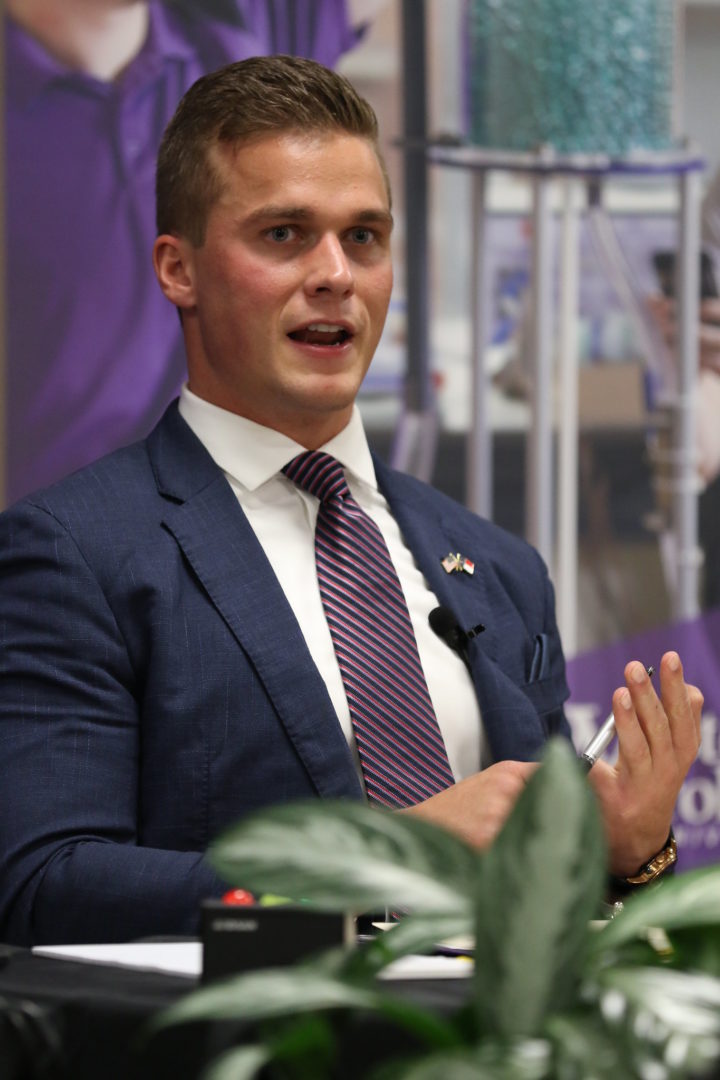
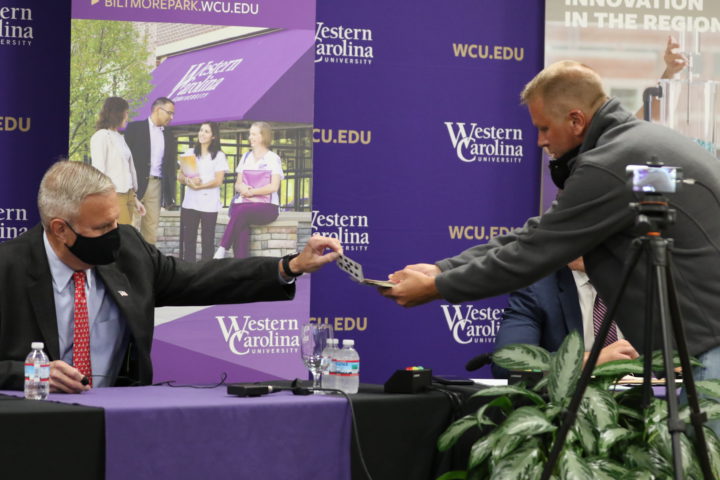

Under the U.S. Constitution, the only right women have is the right to vote. Please ask participating reporters in the next debate to ask the candidates about their support of the Equal Rights Amendment which states, “Equality of rights under the law shall not be denied or abridged by the united States or by any state on account of sex.” Thanks, Jimmie Cochran Pratt
Well, there is the 14th Amendment which calls for equal protection under the law.
But yeah, perhaps someone can ask Cawthron about this:
https://twitter.com/ColMorrisDavis/status/1295838687289380866
Mr. Cawthorn has No political experience, and little life experience, all his political stances parrot those of the cult of Donald Trump, has a disturbing preoccupation with “water boarding” and “AOC,” and despite his denials of white supremacy, and sexual assault, his statements like, “how can I be racist when my fiance is mixed race” (which is debatable), and “I want my son to be able to grow up in a world where he would not be called a sexual predator for trying to kiss someone” still smack of tokenism, misogyny, and privilege.
As Mr. Davis said, “This is not Mr. Smith Goes to Washington” In my opinion, Mr. Cawthorn is patently inexperienced and has a lot more growing up to do before he is saddled with the burden of representing all of WNC.
Anybody seen Bob Roberts? That’s who Cawthorn reminds me of, minus the guitar.
https://www.youtube.com/watch?v=yRpWaJRyVQo
Only in the most ignorant place on earth would a non educated 24 y/o Be neck and neck In the polls w/ a retired COLONEL/ATTORNEY.
ignorance IS bliss around here in the AVL, Jason… strive to be smarter. Cawthorn is correct about liberals always debating silly stupid stuff because they have NO plan nor leadership abilities, so they MUST resort to name calling and minutia to plead their ignorance….
As long as you have money and are successful, you can be a hypocrite, Democrat or Republican. Both parties are hypocrites who only care about money. That’s why I’m voting Green Party on the absentee ballot I ordered to make sure that you hypocrites never get any of my vote and are unable to disenfcranchise me.
Excellent! The “I’m gonna give up my ball and go home!” strategy.
Look for more anonymous “Vote Green” comments over the next few weeks…
Of course! Vladdie’s got all bases covered, doncha know.
sounds like smart money to me…duh.
‘[Cawthorn]’s willing to use tariffs against countries like China that are “violating human rights” — especially if that would bring steady manufacturing jobs back to the region.’
This is the circle that conservatives can’t square. Cawthorn’s wealth comes from an AIG annuity and the stock investments he (via his brother) made from the payment of his insurance claim. Publicly-traded companies have a fiduciary obligation to their shareholders, not to their employees or the broader community.
On Cawthorn’s disclosure form, he says plainly “I made most of my money on the New York Stock Exchange” and his largest investment (by a long way) is in Amazon.com. Last I checked, Amazon delivers ongoing stockholder value by undercutting local retailers and elevating no-name Chinese goods while relying upon casualized high-stress low-wage labor in its warehouses. That new Mills River warehouse? 200 median-wage jobs.
So Cawthorn doesn’t invest his own money in regional manufacturing. And in fairness, why should he? That’s not where the profits are.
https://disclosures-clerk.house.gov/public_disc/financial-pdfs/2020/10033653.pdf
If a home schooled student applying to the US Naval Academy is rejected to one of the best engineering colleges in the world for failing to meet entrance requirements, how would going back and complaining to his Congressional representative change that?
Lying, about being rejected from not having the grades and test scores to get into the Naval Academy, is much worse than not being qualified, which would include most of us. But hey, if it gets you an audition to be Ivanka’s Celebrity Apprentice in Jackson Hole, it’s OK, the ends justify the means?